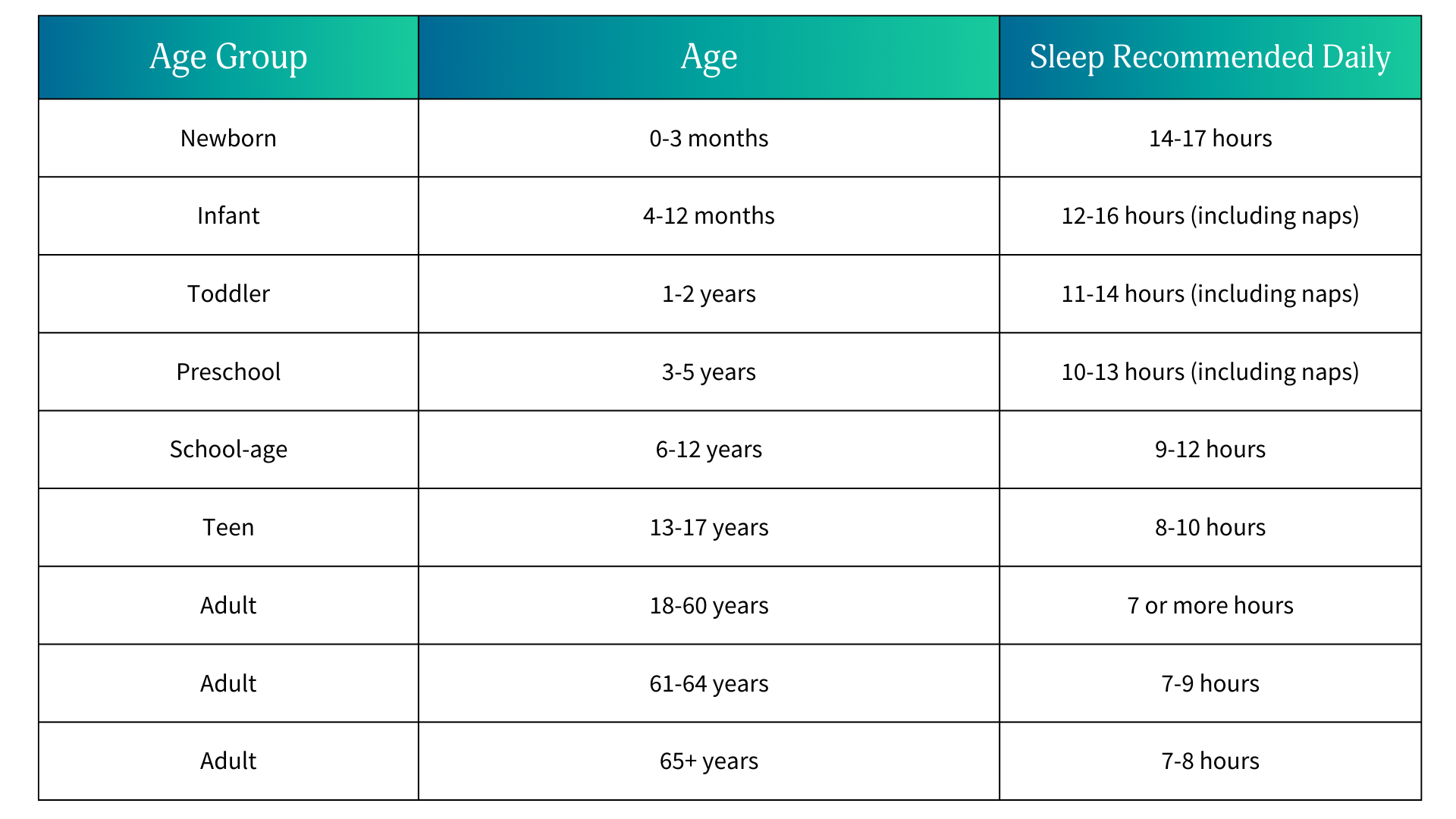How Do I Know If I Have a Sleep Disorder?
- Category: Must-reads
- Posted On:
- Written By: Dr. Peomia Brown, Sleep Medicine Specialist

- How much sleep do you need?
- The amount of sleep required varies significantly across different age groups. Ensuring one gets the recommended amount of sleep is crucial for optimal health and well-being. The following table outlines the daily sleep recommendations for various age groups:

- What are the signs that indicate you may have a sleep disorder?
- Sleep disorders can manifest in various ways, and the specific symptoms can depend on the particular disorder. General signs that may indicate a sleep disorder include:
- Taking more than 30 minutes each night to fall asleep.
- Waking up multiple times during the night with difficulty falling back to sleep or waking up too early.
- Feeling excessively sleepy during the day, needing frequent naps, or falling asleep at the wrong times during the day.
- Snoring loudly, snorting, gasping, choking sounds, or stopping breathing for short periods is noticed by a bed partner.
- Creeping, tingling, or crawling feelings in your legs or arms that are relieved by moving or massaging them, particularly in the evening and when trying to fall asleep
- Frequent leg or arm jerks during sleep noticed by a bed partner
- Vivid, dreamlike experiences while falling asleep or dozing.
- Sudden episodes of muscle weakness when experiencing strong emotions such as laughter or anger.
- Inability to move when waking up.
- Sleep disorders can manifest in various ways, and the specific symptoms can depend on the particular disorder. General signs that may indicate a sleep disorder include:
- How are sleep disorders diagnosed?
- To diagnose a sleep disorder, your healthcare provider will use a combination of your medical history, sleep history, and a physical exam. A polysomnogram, or sleep study, may also be conducted. This study monitors and records various physiological data during a full night of sleep, including:
- Brain wave activity
- Eye movements
- Breathing rate
- Blood pressure
- Heart rate and electrical activity
- Muscle activity
- Other specialized sleep studies may check how quickly you fall asleep during daytime naps or your ability to stay awake and alert during the day.
- To diagnose a sleep disorder, your healthcare provider will use a combination of your medical history, sleep history, and a physical exam. A polysomnogram, or sleep study, may also be conducted. This study monitors and records various physiological data during a full night of sleep, including:
- What are some common sleep disorders?
- Sleep disorders encompass a wide range of conditions that disturb your normal sleep patterns. Some of the most common sleep disorders include:
- Insomnia: Characterized by trouble falling asleep, staying asleep, or getting good quality sleep. Insomnia can impair daily functioning and cause daytime sleepiness. It can be short-term (caused by stress or environmental changes) or chronic (lasting more than three months and occurring multiple times a week).
- Sleep apnea: A condition where breathing stops and starts during sleep, which can prevent your body from getting enough oxygen. There are two main types:
- Obstructive sleep apnea: Caused by physical blockages in the airway, often associated with obesity, large tonsils or hormonal changes
- Central sleep apnea: Resulting from the brain’s failure to send appropriate signals to the muscles controlling breathing.
- Restless leg syndrome (RLS): A neurological disorder causing uncomfortable sensations in the legs and an overwhelming urge to move them, often disrupting sleep.
- Periodic limb movement disorder (PLMD): Characterized by involuntary leg or arm movements during sleep.
- Parasomnias: Unusual behaviors during sleep, such as sleepwalking, talking, or eating.
- Hypersomnia: Excessive daytime sleepiness, including conditions like narcolepsy, where individuals experience sudden, uncontrollable sleep episodes.
- Narcolepsy: A chronic (long-term) disorder marked by extreme daytime sleepiness, including sudden brief episodes of deep sleep. Brief naps or a full night’s sleep may refresh individuals temporarily, but the sleepiness quickly returns.
- Circadian rhythm disorders are disruptions in the natural sleep-wake cycle that lead to difficulties sleeping and waking at normal times.
- Sleep disorders encompass a wide range of conditions that disturb your normal sleep patterns. Some of the most common sleep disorders include:
- What lifestyle changes can you make to help manage sleep disorders?
- Improving your sleep habits can enhance sleep quality and help you manage sleep disorders. Key habits include:
- Going to bed and getting up at the same time every day.
- Creating a quiet, relaxing, cool sleep environment.
- Turning off electronic devices at least 30 minutes before bedtime.
- Avoiding large meals and alcohol before bedtime.
- Limiting caffeine intake in the afternoon or evening.
- Engaging in regular exercise and maintaining a healthy diet.
- Improving your sleep habits can enhance sleep quality and help you manage sleep disorders. Key habits include:
- How do you know when to seek professional help for a sleep disorder?
- Quality sleep means you are getting uninterrupted and restorative sleep. Getting quality sleep is not just about how many hours you sleep but how well you sleep. Poor sleep quality can manifest as difficulty falling asleep, constantly waking up during the night, or feeling sleepy or tired despite getting enough sleep. If these symptoms persist, it may be time to seek professional medical advice to address potential sleep disorders and improve overall sleep health.

.2501160810426.png)

